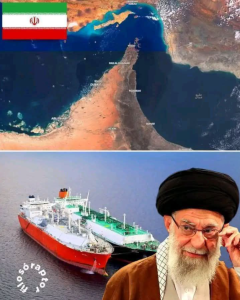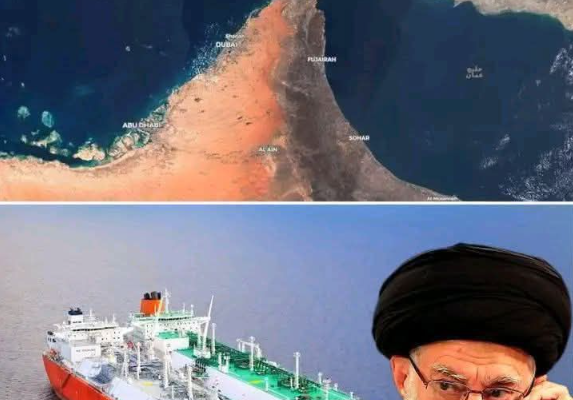
🚨🇮🇷 In a stunning and controversial move that has sent shockwaves across the Middle East and beyond, the Iranian Parliament has officially approved a bill to close the Strait of Hormuz to certain Western and allied nations. The decision, described by Iranian lawmakers as a “strategic defense measure,” comes amid escalating tensions with the United States, Israel, and several Gulf states. If implemented, this closure could have dramatic global consequences — from skyrocketing oil prices to potential military confrontations in one of the world’s most critical waterways.
The Strait of Hormuz is a narrow stretch of water connecting the Persian Gulf to the Arabian Sea, and it serves as the world’s most important oil transit chokepoint. Nearly 20 percent of global oil supply — around 21 million barrels per day — passes through this strait. It is Iran’s ultimate geopolitical lever: control of Hormuz means control over global energy stability. That’s why today’s vote in Tehran is being interpreted not merely as a regional maneuver, but as a direct challenge to the existing world order.
The bill, officially titled The National Sovereignty and Maritime Security Act, was passed after weeks of debate within the Iranian Parliament, known as the Majlis. Out of 290 members, 214 voted in favor, 54 against, and 22 abstained. The measure gives the Iranian Revolutionary Guard Navy authority to block or restrict vessels linked to “hostile states” — particularly those enforcing economic sanctions or engaging in “acts of aggression” against the Islamic Republic. Although the bill does not name specific countries, Iranian state television later clarified that it primarily targets ships from the United States, the United Kingdom, and Israel, as well as any vessels carrying goods or arms destined for them.
The Iranian government framed the move as a necessary act of “defensive sovereignty.” President Masoud Pezeshkian, in a televised address following the vote, declared: “Iran has tolerated economic war and military threats for decades. Today, we send a clear message: our waters will no longer be a highway for those who oppress our nation.” The declaration drew thunderous applause from hardline lawmakers, who chanted “Death to America” and “Hormuz belongs to Iran” as the session concluded.
However, outside Iran, the reaction was swift and alarmed. The White House condemned the vote as “an outrageous provocation,” warning that any attempt to block international shipping lanes would “cross a red line.” The Pentagon has reportedly placed several naval assets in the region on high alert, including the USS Dwight D. Eisenhower aircraft carrier group currently stationed in the Arabian Sea. The U.S. Navy’s Fifth Fleet, headquartered in Bahrain, emphasized that freedom of navigation in the region “will be maintained under all circumstances.”
In Europe, reactions were mixed but cautious. British Prime Minister Keir Starmer urged restraint, saying that the move “risks destabilizing not just the Middle East, but the entire global economy.” Meanwhile, the European Union called for an emergency meeting to discuss possible sanctions or diplomatic measures. China, one of Iran’s key oil customers, expressed “concern” but also hinted that it would seek to mediate. A statement from Beijing urged “dialogue and de-escalation,” reflecting China’s interest in maintaining a steady flow of oil imports through the strait.
Israel’s response, however, was far more direct. Prime Minister Benjamin Netanyahu called the Iranian decision “an act of war against the global community” and vowed that “Israel will not sit idly by while Iran threatens the free movement of energy and commerce.” Analysts believe that Israel could increase covert operations or even strike Iranian naval assets if the situation deteriorates.
The implications of the move are enormous. Global oil markets reacted instantly. Within hours of the announcement, Brent crude prices surged by over 12 percent, reaching levels not seen in more than two years. Energy experts warn that if the closure is enforced, oil could exceed $150 per barrel within days. That would trigger inflationary waves across the world, affecting everything from transportation to food prices. For nations already struggling with economic instability, such as Lebanon, Egypt, and Pakistan, the ripple effects could be devastating.
Iran, meanwhile, seems prepared for the economic fallout. Over the past decade, it has developed alternative trade routes through land corridors linking to China and Russia via the so-called North-South Transport Corridor. It has also deepened energy cooperation with countries less influenced by U.S. sanctions, such as India and Turkey. In this context, Tehran’s decision appears not merely as an act of defiance, but as a calculated gamble — a signal that it is ready to leverage its geographic position to reshape global power dynamics.
The move comes just days after a mysterious drone attack on an Iranian naval base in Bandar Abbas, which Tehran blamed on Israel. Iranian officials claim the closure bill is partly a response to that attack, as well as to the tightening of U.S. sanctions following recent allegations that Iran has been supplying ballistic missiles to Russia. “They hit us with sanctions, we hit them with geography,” said an Iranian lawmaker in an interview with Press TV.
While Iran has threatened to close the Strait of Hormuz before — notably during the Trump administration in 2019 — this is the first time the Iranian Parliament has officially approved a legal framework for doing so. That makes it far more serious than previous rhetoric. The bill gives the Revolutionary Guard Navy explicit authority to “intercept, inspect, and if necessary, detain” foreign vessels in Iranian territorial waters. The Guard’s commander, Admiral Alireza Tangsiri, issued a blunt statement following the vote: “If the Americans wish to test our resolve, they will meet the same fate as their drones — shot down before crossing our line.”
Military analysts are divided on whether Iran will actually enforce the closure. Some believe the move is largely symbolic — a way to project strength amid domestic unrest and economic hardship. Others warn that even a partial blockade or a single military incident could spiral into a broader conflict. “All it takes is one mistake,” said retired U.S. Admiral James Stavridis. “If a single missile hits a tanker, the world economy will feel it overnight.”
Inside Iran, reactions have been mixed. Hardliners celebrated the vote as a patriotic triumph, while reformists warned that it could provoke a devastating confrontation. Protests have already erupted in parts of Tehran, with citizens expressing fears that a military escalation could worsen living conditions. “We don’t want another war,” one demonstrator told BBC Persian. “We need food, not rockets.”
In the broader geopolitical context, Iran’s decision could have long-term consequences for regional alliances. Saudi Arabia and the United Arab Emirates, both major oil exporters dependent on the strait, have reportedly opened quiet backchannel talks with Washington to coordinate a response. There are also reports that the Gulf Cooperation Council (GCC) may call for a joint naval task force to ensure safe passage for oil shipments — a move that could bring Arab states and Western powers into closer military alignment.
At the same time, Russia and China could use the crisis to their advantage. Both have deepened their strategic partnerships with Iran, and each might view this moment as an opportunity to undermine Western influence. Moscow, in particular, may quietly welcome the rise in oil prices, which would bolster its own energy revenues amid the war in Ukraine.
For now, the world waits and watches. The Strait of Hormuz — that narrow blue ribbon between Iran and Oman — has always been a symbol of fragile balance. One miscalculation could transform it into a flashpoint for global chaos. As Iranian lawmakers celebrate their victory in Parliament, naval commanders on all sides are mobilizing, oil traders are holding their breath, and millions of people across the world are bracing for what comes next.

